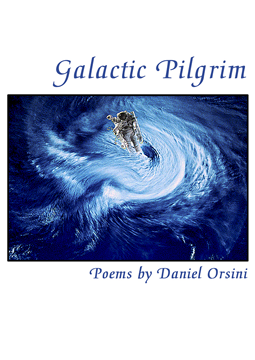
Comments on Daniel Orsini’s Galactic Pilgrim In Galactic Pilgrim Daniel Orsini depicts an array of scenes, exhibits an astounding reach of language, juxtaposes complex and interconnected levels of thought, and orchestrates fine rhythms. The sum being more than the parts, the whole of Galactic Pilgrim adds up to an erudite set of reflective poems for the contemporary reader. In this unusual poetry of sound, sense, and self, Daniel Orsini keenly crafts epitomic images and philosophic visions of man in a redeemed world. For the reader, like the communicant experiencing transubstantiation, these words metamorphose in the believer’s mind—indeed, in the soul of his very being—into spiritual acknowledgments of Christ’s primacy and man’s ultimate wholeness in the world. With so much pedestrian religiosity out and about today, Galactic Pilgrim challenges readers with substantial contemporary reflections on man’s nature and his metaphysical being. The extensive structuring of this poetry reveals the incessant discipline of a talented wordsmith, as well as the all-embracing faith of an unswerving believer. (Ben McClelland is the author of Soldier’s Son.) ....... ....... ....... ....... ....... ....... ....... ....... ....... ....... ....... Daniel Orsini’s Galactic Pilgrim is a wonderful book of modern metaphysical poems. I had not read modern poetry in rhyme for a long time and felt at first that rhyme concealed the poems’ stunning modernity. But, as I read on, I realized that the rhyme went well with these poems, since they are metaphysical in all senses of the word. They remind us of Metaphysical Poetry in the manner of Donne and Herbert in that they merge the large or infinite with the small—“history’s climax small as a bean” (37), “foetus in the googolsphere” (54), “Spacetime’s handkerchief” (61), or, with a pun on space, “Entering in space in bunting we toddle” (55). Many of the poems start George Herbert-like with something like a personal allegorical story. More importantly, the poems are metaphysical in the ordinary sense in that they grapple with a modern “hyphenated” or “splitminded” (both Orsini’s words) consciousness—often a Christian’s unsettling realization of infinite space around us: we are a “mote at play” in the void (42) and “dangle in space” (49). At the end, Orsini had persuaded me that rhyme was fitting, for almost every poem plays on powerful symbols of the past, as, for instance, the unforgettable poem “Saturn’s Gramophone,” behind which, I suppose, are ancient notions of the music of the spheres. |
